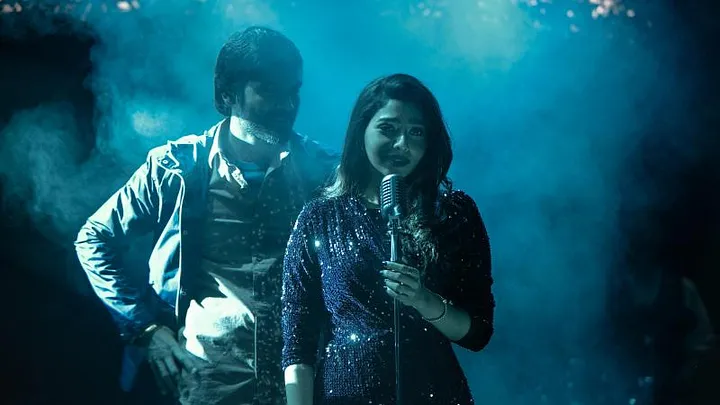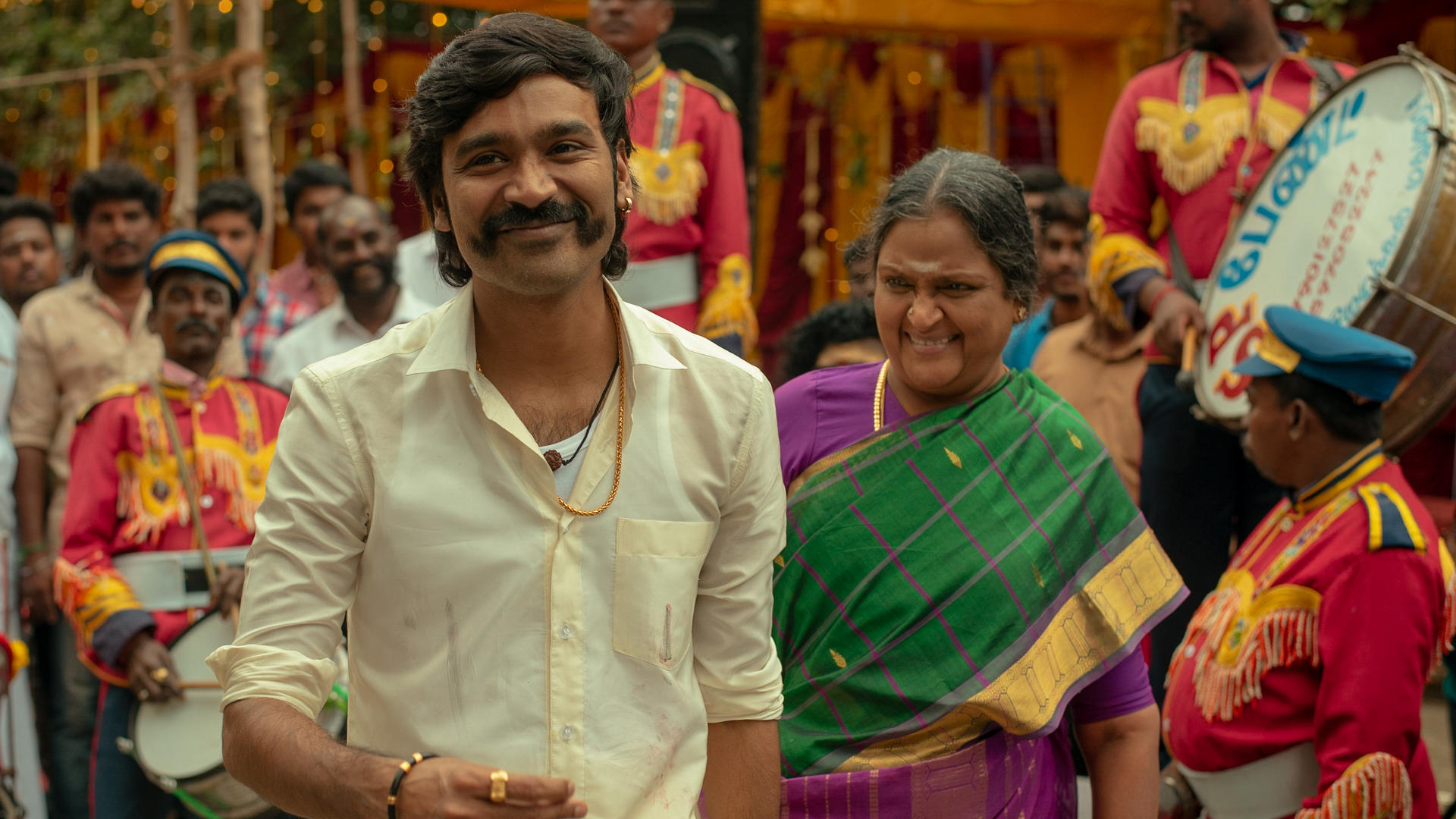Indian action-thriller Jagame Thandhiram (translated as The Universe Is A Ruse) follows the story of a clever and carefree gangster in Madurai, India, who is recruited to help a European crime lord take down a rival, but is later caught off-guard by the moral dilemmas that follow. The movie is led by Tamil entertainer, Dhanush, with supporting performances by Aishwariya Lekshmi, Joju George and James Cosmo. Released on Netflix in 2021, Jagame Thandhiram strays from traditional cross-cultural integrations in Indian cinema and instead, addresses several significant social issues that are being faced in present day.
What’s it all about?
Dhanush plays the role of Suruli, who is recognized among his village for his thug-like behaviour, that eventually results in Peter Sprott (James Cosmo), a white supremacist don in recruiting him to eliminate his rival, an Indian crime lord by the name of Sivadoss (Joju George). Suruli is perceived as greedy and cunning; though he witnesses Peter’s blatantly racist tendencies, he is more motivated by the financial compensations offered by the don. He is quick to infiltrate Sivadoss’s operations in London and even manages to get rid of his right-hand man, much to the pleasure of Peter. Suruli’s experiences in London reveal a background of social and political unrest; much of the immigrant and refugee population in the UK face the threat of deportation and prison due to BICORE, a pending bill in the British parliament. With the support of Peter and other lawmakers, the bill is expected to restrict immigration and minimize the population of expatriates living in the UK.
Much of the film focuses on the moral dilemmas Suruli faces in betraying immigrants like himself and his own countryfolk, for the sake of money. When confronted by Sivadoss, a Tamil native like himself, Suruli remarks that he is only looking to make a life without crime and for that, he needs money which Peter is more than willing to provide. He even manipulates Sivadoss into believing that he has switched sides, only to lead him to a trap and let Peter murder him in exchange for a sizeable piece of land that allows Suruli to open a successful fleet of restaurants and begin a life outside of crime. Nevertheless, these events still enable the audience to witness the themes of racism and xenophobia that exist within the UK. One noticeable encounter was when Suruli meets Murugesan, an old friend from his village who had left years ago to start his own restaurant abroad. Despite emigrating to the UK for a chance of a better life, Murugesan reveals that he has been working as a server for the past couple of decades, indicating the lack of opportunities available for immigrants in developed nations.
“Look how life is! He would rather believe a white-skin but doubt his own skin?”
– Sivadoss, when confronting Suruli
The importance of language and culture
The movie also makes note of the use of language barriers and cultural differences to mock and insult the lifestyles of immigrants. Many of the scenes featured Peter referring to the immigrant population as “little brown men” and even asking Sivadoss if he would like some curry. His flagrant displays of racism such as having ‘White Power’ written across his license plate, are tolerated and dismissed, suggesting it as customary behaviour within the country. Peter is even mentioned as having private prisons for undocumented immigrants, which is why he is so persistent to get the BICORE bill passed. The integration of Sivadoss’s storyline further adds to the treatment of refugees and immigrants entering the UK; the don was revealed to have been working to get documentation papers for incoming refugees and lobbying the BICORE bill, leading to an influx of immigrants getting accommodation and employment in the country. Though this incurred heavy costs, Sivadoss managed to cover them by smuggling gold and weapons. While Sivadoss was considered a revolutionist by many, in the eyes of Peter, he was a terrorist.
Between the scenes featuring Suruli on his escapades, viewers are presented with shots of immigrants being arrested in broad daylight as they are ripped away from their families and pushed into waiting police cars, never to be seen again. The introduction of Attila (Aishwariya Lekshmi) as Suruli’s love interest, intensified these scenes due to her own status as a former refugee who lost her brother to the authorities on the course of emigrating to London. Attila’s story revealed the horrors of life as a refugee; having to experience bombs dropped on their land, being forced to bury their loved ones in unmarked mass graves and living their lives without a place to call home. Even when living in refugee camps, they are faced with the prospect of being exploited and sold off for slavery and prostitution. She also highlights the struggles of becoming a legally documented immigrant and having to cross multiple national borders before finally settling down in the UK.

Character development
Attila’s introduction and story was instrumental in Suruli’s character development and changing his ignorant perceptions regarding worldwide issues. When Suruli states that it only hurts when it’s personal, it reflects the general lack of empathy and priority given to the issues and concerns of immigrants around the world. He comes to realize the integral role immigrants have continued to play in the British economy as his restaurants have served as spaces of comfort and familiarity for the Tamil-speaking population of London. This is eventually what leads him to betray Peter and take down his operations, resulting in the BICORE bill being rejected in parliament.
The movie also makes a point to subtly emphasize on the cultural differences and conflicts as well as the importance of preserving cultures and traditions. Suruli admits to not knowing about the concept of dating before marriage in his attempts to court Attila as arranged marriages were the norm in his village. Even in his criminal activities, Suruli presents a preference towards making bombs which are formulated in a style that is more common in his country. He also dons a mundu, a traditional sarong-like garment worn in Indian states, despite moving to London and opens a restaurant specializing in parotta, a type of flatbread that is commonly available in Kerala and Tamil Nadu. Additionally, Suruli persists in performing last rites for Murugesan after his death, even though he was in the presence of Peter’s henchmen.
“Our men are tigers, not traitors.”
– Sivadoss, when questioned on the loyalty of his men.
How cinematography might impact the movie experience
The cinematography of the film further enhanced the storyline with visually stunning shots of the London scenery and the decorated environments of India. Though there was excessive usage of the yellow filter in the scenes filmed in India, the lighting of the movie added an element of elusiveness that contributed to the atmosphere and characters. Scenes involving Peter had cooler and sharper lighting, further enhancing the cold cruelty of his personality whereas scenes with Sivadoss were illuminated with dimmer, warmer means to highlight his secretive nature of his kind persona. In addition to this, much like other Indian movies, Jagame Thandhiram utilizes musical numbers to prolong the overall screen time of the movie. While this is a staple amidst the backdrop of the classic Bollywood trope, it also felt awkward and out of place in the face of highlighting such serious topics.
Despite the many positives of the film, Jagame Thandhiram still has its limitations. The performances by Dhanush, George and Cosmo are void of chemistry and present forced dialogues that ensure a lack of elegance across the scenes. The storyline did emphasize on critical issues but coupled with the overall clumsy acting and poor comedic timing, the film proved to be too fun to be serious and too serious to be fun. It also failed to properly convey the emotions of immigrants and refugees, who were essential to the film’s plot; Attila and her family were mostly used as side characters for the purpose of Suruli’s development and to trigger the movie’s climax where Peter was apprehended. All in all, the predictability of the story resulted in the movie losing most of its value.
Why you should watch Jagame Thandhiram
Though the events of featured in Jagame Thandhiram are fictional, the issues highlighted in the film are still very much real and run rampant in today’s socio-political climate. Racism against Asians have long been established in the UK, resulting in a growing trend of xenophobia and hate crimes against minority groups. These developments are directly tied to the racist notions that have been perpetuated throughout global history, and are prevalent in many race-oriented debates and discussions today. Though the film ends with the defeat of the BICORE bill, it is necessary to understand that the social issues highlighted in this film need to be properly addressed, outside of the confines of mediums of entertainment.
Check out:
Misogyny and Tattoos: The History of the Tramp Stamp
Childhood Sweethearts, Invisible Strings, and Predestined Bonds in ‘Past Lives’












Be First to Comment